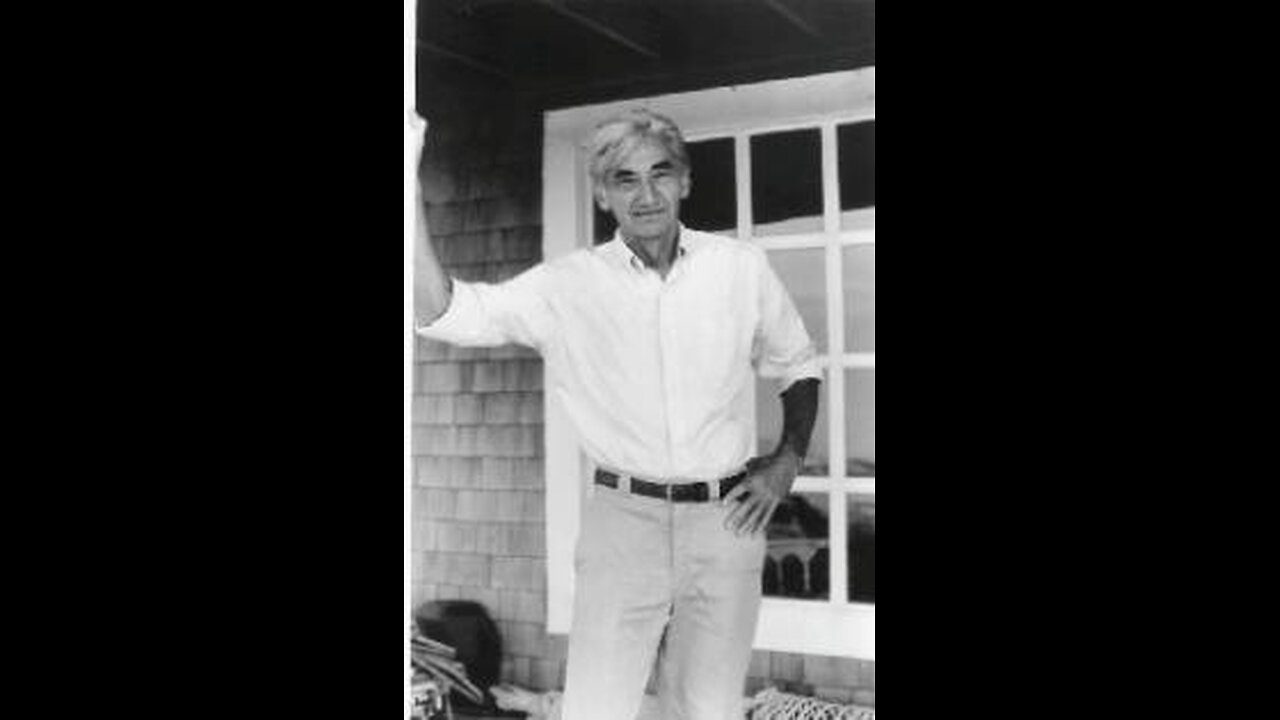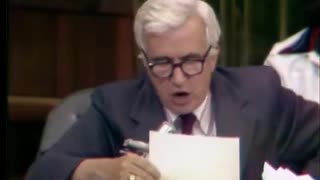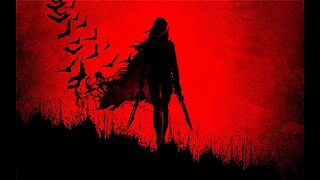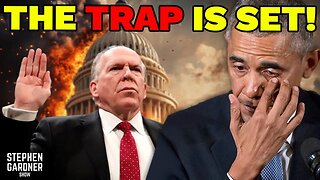Premium Only Content

This Is Not the History that We Were Taught in High School (1998)
Zinn wrote one of the earliest books calling for the U.S. withdrawal from its war in Vietnam. Vietnam: The Logic of Withdrawal was published by Beacon Press in 1967 based on his articles in Commonweal, The Nation, and Ramparts. In the opinion of Noam Chomsky, The Logic of Withdrawal was Zinn's most important book:
"He was the first person to say—loudly, publicly, very persuasively—that this simply has to stop; we should get out, period, no conditions; we have no right to be there; it's an act of aggression; pull out. It was so surprising at the time that there wasn't even a review of the book. In fact, he asked me if I would review it in Ramparts just so that people would know about the book."[54]
Zinn's diplomatic visit to Hanoi with Reverend Daniel Berrigan, during the Tet Offensive in January 1968, resulted in the return of three American airmen, the first American POWs released by the North Vietnamese since the U.S. bombing of that nation had begun. The event was widely reported in the news media and discussed in a variety of books including Who Spoke Up? American Protest Against the War in Vietnam 1963–1975 by Nancy Zaroulis and Gerald Sullivan.[55] Zinn and the Berrigan brothers, Dan and Philip, remained friends and allies over the years.
Also in January 1968, he signed the "Writers and Editors War Tax Protest" pledge, vowing to refuse tax payments in protest against the war.[56]
In December 1969, radical historians tried unsuccessfully to persuade the American Historical Association to pass an anti-Vietnam War resolution. "A debacle unfolded as Harvard historian (and AHA president in 1968) John Fairbank literally wrestled the microphone from Zinn's hands."[57]
Daniel Ellsberg, a former RAND consultant who had secretly copied The Pentagon Papers, which described the history of the United States' military involvement in Southeast Asia, gave a copy to Howard and Roslyn Zinn.[58] Along with Noam Chomsky, Zinn edited and annotated the copy of The Pentagon Papers that Senator Mike Gravel read into the Congressional Record and that was subsequently published by Beacon Press.
Announced on August 17[59] and published on October 10, 1971, this four-volume, relatively expensive set[59] became the "Senator Gravel Edition", which studies from Cornell University and the Annenberg Center for Communication have labeled as the most complete edition of the Pentagon Papers to be published.[60][61] The "Gravel Edition" was edited and annotated by Noam Chomsky and Howard Zinn, and included an additional volume of analytical articles on the origins and progress of the war, also edited by Chomsky and Zinn.[61]
Zinn testified as an expert witness at Ellsberg's criminal trial for theft, conspiracy, and espionage in connection with the publication of the Pentagon Papers by The New York Times. Defense attorneys asked Zinn to explain to the jury the history of U.S. involvement in Vietnam from World War II through 1963. Zinn discussed that history for several hours, and later reflected on his time before the jury.
I explained there was nothing in the papers of military significance that could be used to harm the defense of the United States, that the information in them was simply embarrassing to our government because what was revealed, in the government's own interoffice memos, was how it had lied to the American public. ... The secrets disclosed in the Pentagon Papers might embarrass politicians, might hurt the profits of corporations wanting tin, rubber, oil, in far-off places. But this was not the same as hurting the nation, the people.[62]
Most of the jurors later said that they voted for acquittal. However, the federal judge who presided over the case dismissed it on grounds it had been tainted by the Nixon administration's burglary of the office of Ellsberg's psychiatrist.
Zinn's testimony on the motivation for government secrecy was confirmed in 1989 by Erwin Griswold, who as U.S. solicitor general during the Nixon administration sued The New York Times in the Pentagon Papers case in 1971 to stop publication.[63] Griswold persuaded three Supreme Court justices to vote to stop The New York Times from continuing to publish the Pentagon Papers, an order known as "prior restraint" that has been held to be illegal under the First Amendment to the U.S. Constitution. The papers were simultaneously published in The Washington Post, effectively nullifying the effect of the prior restraint order. In 1989, Griswold admitted there had been no national security damage resulting from publication.[63] In a column in The Washington Post, Griswold wrote: "It quickly becomes apparent to any person who has considerable experience with classified material that there is massive over-classification and that the principal concern of the classifiers is not with national security, but with governmental embarrassment of one sort or another."
Zinn supported the G.I. anti-war movement during the U.S. war in Vietnam. In the 2001 film Unfinished Symphony: Democracy and Dissent, Zinn provides a historical context for the 1971 anti-war march by Vietnam Veterans against the War. The marchers traveled from Bunker Hill near Boston to Lexington, Massachusetts, "which retraced Paul Revere's ride of 1775 and ended in the massive arrest of 410 veterans and civilians by the Lexington police." The film depicts "scenes from the 1971 Winter Soldier hearings,[64] during which former G.I.s testified about "atrocities" they either participated in or said they had witnessed committed by U.S. forces in Vietnam.[65] Zinn also took part in the 1971 May Day protests (with among others Noam Chomsky and Daniel Ellsberg).[66][67]
In later years, Zinn was an adviser to the Disarm Education Fund.[68]
Iraq
Howard Zinn speaking at Marlboro College February 2004
Zinn opposed the 2003 invasion and occupation of Iraq and wrote several books about it. In an interview with The Brooklyn Rail he said,
We certainly should not be initiating a war, as it's not a clear and present danger to the United States, or in fact, to anyone around it. If it were, then the states around Iraq would be calling for a war on it. The Arab states around Iraq are opposed to the war, and if anyone's in danger from Iraq, they are. At the same time, the U.S. is violating the U.N. charter by initiating a war on Iraq. Bush made a big deal about the number of resolutions Iraq has violated—and it's true, Iraq has not abided by the resolutions of the Security Council. But it's not the first nation to violate Security Council resolutions. Israel has violated Security Council resolutions every year since 1967. Now, however, the U.S. is violating a fundamental principle of the U.N. Charter, which is that nations can't initiate a war—they can only do so after being attacked. And Iraq has not attacked us.[69]
He asserted that the U.S. would end Gulf War II when resistance within the military increased in the same way resistance within the military contributed to ending the U.S. war in Vietnam. Zinn compared the demand by a growing number of contemporary U.S. military families to end the war in Iraq to parallel demands "in the Confederacy in the Civil War, when the wives of soldiers rioted because their husbands were dying and the plantation owners were profiting from the sale of cotton, refusing to grow grains for civilians to eat."[70]
Zinn believed that U.S. President George W. Bush and followers of Abu Musab al-Zarqawi, the former leader of al-Qaeda in Iraq, who was personally responsible for beheadings and numerous attacks designed to cause civil war in Iraq, should be considered moral equivalents.[71]
Jean-Christophe Agnew, Professor of History and American Studies at Yale University, told the Yale Daily News in May 2007 that Zinn's historical work is "highly influential and widely used".[72] He observed that it is not unusual for prominent professors such as Zinn to weigh in on current events, citing a resolution opposing the war in Iraq that was recently ratified by the American Historical Association.[73] Agnew added: "In these moments of crisis, when the country is split—so historians are split."[74]
Socialism
Zinn described himself as "something of an anarchist, something of a socialist. Maybe a democratic socialist."[4][5] He suggested looking at socialism in its full historical context as a popular, positive idea that got a bad name from its association with Soviet Communism. In Madison, Wisconsin, in 2009, Zinn said:
Let's talk about socialism. I think it's very important to bring back the idea of socialism into the national discussion to where it was at the turn of the [last] century before the Soviet Union gave it a bad name. Socialism had a good name in this country. Socialism had Eugene Debs. It had Clarence Darrow. It had Mother Jones. It had Emma Goldman. It had several million people reading socialist newspapers around the country. Socialism basically said, hey, let's have a kinder, gentler society. Let's share things. Let's have an economic system that produces things not because they're profitable for some corporation, but produces things that people need. People should not be retreating from the word socialism because you have to go beyond capitalism.[75]
FBI files
Occupy Oakland, November 12, 2011, Howard Zinn quotation
On July 30, 2010, a Freedom of Information Act (FOIA) request resulted in the Federal Bureau of Investigation (FBI) releasing a file with 423 pages of information on Howard Zinn's life and activities. During the height of McCarthyism in 1949, the FBI first opened a domestic security investigation on Zinn (FBI File # 100-360217), based on Zinn's activities in what the agency considered to be communist front groups, such as the American Labor Party,[76] and informant reports that Zinn was an active member of the Communist Party of the United States (CPUSA).[77] Zinn denied ever being a member and said that he had participated in the activities of various organizations which might be considered Communist fronts, but that his participation was motivated by his belief that in this country people had the right to believe, think, and act according to their own ideals.[77] According to journalist Chris Hedges, Zinn "steadfastly refused to cooperate in the anti-communist witchhunts in the 1950s."[78]
Later in the 1960s, as a result of Zinn's campaigning against the Vietnam War and his communication with Martin Luther King Jr., the FBI designated him a high security risk to the country by adding him to the Security Index, a list of American citizens who could be summarily arrested if a state of emergency were to be declared.[77][79] The FBI memos also show that they were concerned with Zinn's repeated criticism of the FBI for failing to protect black people against white mob violence. Zinn's daughter said she was not surprised by the files: "He always knew they had a file on him".[77]
Personal life and death
Zinn at Pathfinder Bookstore, Los Angeles, August 2000
Zinn married Roslyn Shechter in 1944. They remained married until her death in 2008. They had a daughter, Myla, and a son, Jeff. Myla is the wife of mindfulness instructor Jon Kabat-Zinn.[80]
Zinn was swimming in a hotel pool when he died of an apparent heart attack[81] in Santa Monica, California, on January 27, 2010, at the age of 87. He had been scheduled to speak at Crossroads School and Santa Monica Museum of Art for an event titled "A Collection of Ideas... the People Speak."[82]
In one of his last interviews,[83] Zinn stated that he would like to be remembered "for introducing a different way of thinking about the world, about war, about human rights, about equality," and
for getting more people to realize that the power which rests so far in the hands of people with wealth and guns, that the power ultimately rests in people themselves and that they can use it. At certain points in history, they have used it. Black people in the South used it. People in the women's movement used it. People in the anti-war movement used it. People in other countries who have overthrown tyrannies have used it.
He said he wanted to be known as "somebody who gave people a feeling of hope and power that they didn't have before."[84]
Notable recognition
2008 Howard Zinn was selected as a special senior advisor to Miguel d'Escoto Brockmann, the president of the United Nations General Assembly 63rd session.
Established by a former Boston University student of Zinn's and two nonprofit organizations (Rethinking Schools and Teaching for Change) while he was alive, the Zinn Education Project is Howard Zinn's legacy to middle- and high-school teachers and their students.[30] The project offers classroom teachers free lessons based on A People's History of the United States and like-minded history texts.
Awards
"I can't think of anyone who had such a powerful and benign influence. His historical work changed the way millions of people saw the past. The happy thing about Howard was that in the last years he could gain satisfaction that his contributions were so impressive and recognized."[6]
— Noam Chomsky
In 1991 the Thomas Merton Center for Peace and Social Justice in Pittsburgh awarded Zinn the Thomas Merton Award for his activism and work on national and international issues that transform our world.[85] For his leadership in the Peace Movement, Zinn received the Peace Abbey Courage of Conscience Award in 1996.[86] In 1998 he received the Eugene V. Debs Award,[87] the Firecracker Alternative Book Award in the Politics category for The Zinn Reader: Writings on Disobedience and Democracy,[88] and the Lannan Literary Award for nonfiction.[89] The following year he won the Upton Sinclair Award, which honors those whose work illustrates an abiding commitment to social justice and equality.[90]
In 2003, Zinn was awarded the Prix des Amis du Monde diplomatique for the French version of his seminal work, Une histoire populaire des Etats-Unis.[91]
On October 5, 2006, Zinn received the Haven's Center Award for Lifetime Contribution to Critical Scholarship in Madison, Wisconsin.[92]
Reception
In July 2013, the Associated Press revealed that Mitch Daniels, when he was the sitting Republican Governor of Indiana, asked for assurance from his education advisors that Zinn's works were not taught in K–12 public schools in the state.[93] The AP had gained access to Daniels' emails under a Freedom of Information Act request. Daniels also wanted a "cleanup" of K–12 professional development courses to eliminate "propaganda and highlight (if there is any) the more useful offerings."[94] In one of the emails, Daniels expressed contempt for Zinn upon his death:[95]
This terrible anti-American academic has finally passed away...The obits and commentaries mentioned his book, A People's History of the United States, is the 'textbook of choice in high schools and colleges around the country.' It is a truly execrable, anti-factual piece of disinformation that misstates American history on every page. Can someone assure me that it is not in use anywhere in Indiana? If it is, how do we get rid of it before more young people are force-fed a totally false version of our history?
At the time the emails were released, Daniels was serving as the president of Purdue University. In response, 90 Purdue professors issued an open letter expressing their concern.[96][97][98][99] Because of Daniels' attempt to remove Zinn's book, the former governor was accused of censorship, to which Daniels responded by saying that his views were misrepresented, and that if Zinn were alive and a member of the Purdue faculty, he would defend his free speech rights and right to publish. But he said that would not give Zinn an "entitlement to have that work foisted on school children in public schools."[100]
Stanford education professor Sam Wineburg has criticized Zinn's research. Wineburg acknowledged that A People's History of the United States was an important contribution for overlooked alternative perspectives, but criticised the book's coverage of the mid-thirties to the Cold War. According to reviewer David Plotnikoff from Stanford, Wineburg shows that "A People's History perpetrates the same errors of historical practice as the tomes it aimed to correct", for "Zinn's desire to cast a light on what he saw as historic injustice was a crusade built on secondary sources of questionable provenance, omission of exculpatory evidence, leading questions and shaky connections between evidence and conclusions".[101][102]
Daniel J. Flynn, an author and columnist at the conservative The American Spectator, wrote that Zinn's history was biased.[103] Michael Kazin, professor at Georgetown University and co-editor of the leftist magazine Dissent,, praised Zinn's A People's History of the United States for its dramatic condemnation of the exploitation of the masses by an elite few, and for its lavish use of quotes from social rebels and revolutionaries, though he describes it as somewhat simplified.[104] Kazin has also provided criticism saying "A People's History is bad history, albeit gilded with virtuous intentions. Zinn reduces the past to a Manichean fable."[105]
Mary Grabar, a resident fellow at the Alexander Hamilton Institute for the Study of Western Civilization, accused Zinn of plagiarizing a polemic by novelist and anti-Vietnam War activist Hans Koning in The People's History, and editing Koning's narrative to remove what Grabar said was the "devout Catholic Columbus’s concern for the natives".[106][107]
In early 2017, lawmaker Kim Hendren attempted to ban books written by Zinn from Arkansas public schools.[108][109]
Bibliography
Author
LaGuardia in Congress (1959; based on his 1958 Ph.D. dissertation Fiorello LaGuardia in Congress) OCLC 642325734.
The Southern Mystique (1962) OCLC 423360.
SNCC: The New Abolitionists (1964) OCLC 466264063.
New Deal Thought (editor) (1965) OCLC 422649795.
Vietnam: The Logic of Withdrawal (1967) OCLC 411235.
Disobedience and Democracy: Nine Fallacies on Law and Order (1968, re-issued 2002) ISBN 978-0-89608-675-3.
The Politics of History (1970) (2nd edition 1990) ISBN 978-0-252-06122-6.
The Pentagon Papers Senator Gravel Edition. Vol. Five. Critical Essays. Boston. Beacon Press, 1972. 341p. plus 72p. of Index to Vol. I–IV of the Papers, Noam Chomsky, Howard Zinn, editors. ISBN 978-0-8070-0522-4.
Justice in Everyday Life: The Way It Really Works (Editor) (1974) ISBN 978-0-688-00284-8.
Justice? Eyewitness Accounts (1977) ISBN 978-0-8070-4479-7.
— (2009). A People's History of the United States: 1492-present. HarperCollins. ISBN 978-0060528423. LCCN 2002032895. OCLC 699879349. OL 3563811M. Retrieved 8 July 2022 – via Internet Archive.
See also A People's History of the United States
Klein, Maxine; Sargent, Lydia; — (1986). Playbook. South End Press. ISBN 978-0896083097. LCCN 86006754. OCLC 13116400. OL 2713846M.
Declarations of Independence: Cross-Examining American Ideology (1991) ISBN 978-0-06-092108-8.[110]
A People's History of the United States: The Civil War to the Present Kathy Emery and Ellen Reeves, Howard Zinn (2003 teaching edition) Vol. I: ISBN 978-1-56584-724-8. Vol II: ISBN 978-1-56584-725-5.
Failure to Quit: Reflections of an Optimistic Historian (1993) ISBN 978-1-56751-013-3.
You Can't Be Neutral on a Moving Train: A Personal History of Our Times (autobiography)(1994) ISBN 978-0-8070-7127-4
A People's History of the United States: The Wall Charts by Howard Zinn and George Kirschner (1995) ISBN 978-1-56584-171-0.
Hiroshima: Breaking the Silence (pamphlet, 1995) ISBN 978-1-884519-14-7.
The Zinn Reader: Writings on Disobedience and Democracy (1997) ISBN 978-1-888363-54-8; 2nd edition (2009) ISBN 978-1-58322-870-8.
The Cold War & the University: Toward an Intellectual History of the Postwar Years (Noam Chomsky (Editor) Authors: Ira Katznelson, R. C. Lewontin, David Montgomery, Laura Nader, Richard Ohmann,[111] Ray Siever, Immanuel Wallerstein, Howard Zinn (1997) ISBN 978-1-56584-005-8.
Marx in Soho: A Play on History (1999) ISBN 978-0-89608-593-0.
The Future of History: Interviews With David Barsamian (1999) ISBN 978-1-56751-157-4.
Howard Zinn on War (2000) ISBN 978-1-58322-049-8.
Howard Zinn on History (2000) ISBN 978-1-58322-048-1.
La Otra Historia De Los Estados Unidos (2000) ISBN 978-1-58322-054-2.
Three Strikes: Miners, Musicians, Salesgirls, and the Fighting Spirit of Labor's Last Century (Dana Frank, Robin Kelley, and Howard Zinn) (2002) ISBN 978-0-8070-5013-2.
Terrorism and War (2002) ISBN 978-1-58322-493-9. (interviews, Anthony Arnove (Ed.))
The Power of Nonviolence: Writings by Advocates of Peace Editor (2002) ISBN 978-0-8070-1407-3.
Emma: A Play in Two Acts About Emma Goldman, American Anarchist (2002) ISBN 978-0-89608-664-7.
Artists in Times of War (2003) ISBN 978-1-58322-602-5.
The 20th century: A People's History (2003) ISBN 978-0-06-053034-1.
A People's History of the United States: Teaching Edition Abridged (2003 updated) ISBN 978-1-56584-826-9.
Passionate Declarations: Essays on War and Justice (2003) ISBN 978-0-06-055767-6.
Iraq Under Siege, The Deadly Impact of Sanctions and War, co-author (2003)
Howard Zinn On Democratic Education Donaldo Macedo, Editor (2004) ISBN 978-1-59451-054-0.
The People Speak: American Voices, Some Famous, Some Little Known (2004) ISBN 978-0-06-057826-8.
Voices of a People's History of the United States (with Anthony Arnove, 2004) ISBN 978-1-58322-647-6; 2nd edition (2009) ISBN 978-1-58322-916-3.
A People's History of the Civil War: Struggles for the Meaning of Freedom by David Williams, Howard Zinn (Series Editor) (2005) ISBN 978-1-59558-018-4.
A Power Governments Cannot Suppress (2006) ISBN 978-0-87286-475-7.
Original Zinn: Conversations on History and Politics (2006) Howard Zinn and David Barsamian.
A People's History of American Empire (2008) by Howard Zinn, Mike Konopacki and Paul Buhle. ISBN 978-0-8050-8744-4.
A Young People's History of the United States, adapted from the original text by Rebecca Stefoff; illustrated and updated through 2006, with new introduction and afterword by Howard Zinn; two volumes, Seven Stories Press, New York, 2007.
Vol. 1: Columbus to the Spanish–American War. ISBN 978-1-58322-759-6.
Vol. 2: Class Struggle to the War on Terror. ISBN 978-1-58322-760-2.
One-volume edition (2009) ISBN 978-1-58322-869-2.
The Bomb (City Lights Publishers, 2010) ISBN 978-0-87286-509-9.
The Historic Unfulfilled Promise (City Lights Publishers, 2012) ISBN 978-0-87286-555-6.
Howard Zinn Speaks: Collected Speeches 1963-2009 (Haymarket Books, 2012) ISBN 978-1-60846-259-9.
Truth Has a Power of Its Own: Conversations About A People's History by Howard Zinn and Ray Suarez (The New Press, 2019) ISBN 978-1-62097-517-6.
Contributor
Ars Americana Ars Politica: Partisan Expression in Contemporary American Literature and Culture. by Peter Swirski (2010) ISBN 978-0-7735-3766-8.
Admirable Radical: Staughton Lynd and Cold War Dissent, 1945–1970 (2010), Kent State University Press by Carl Mirra ISBN 978-1-60635-051-5.
A Gigantic Mistake by Mickey Z (2004) ISBN 978-1-930997-97-4.
A People's History of the Supreme Court by Peter H. Irons (2000) ISBN 978-0-14-029201-5.
A Political Dynasty In North Idaho, 1933–1967 by Randall Doyle (2004) ISBN 978-0-7618-2843-3.
American Political Prisoners: Prosecutions Under the Espionage and Sedition Acts by Stephen M. Kohn (1994) ISBN 978-0-275-94415-5.
American Power and the New Mandarins by Noam Chomsky (2002) ISBN 978-1-56584-775-0.
Broken Promises Of America: At Home And Abroad, Past And Present: An Encyclopedia For Our Times by (Douglas F. Dowd (2004) ISBN 978-1-56751-313-4.
Deserter From Death: Dispatches From Western Europe 1950–2000 by Daniel Singer (2005) ISBN 978-1-56025-642-7.
Ecocide of Native America: Environmental Destruction of Indian Lands and Peoples by Donald Grinde, Bruce Johansen (1994) ISBN 978-0-940666-52-8.
Eugene V. Debs Reader: Socialism and the Class Struggle by William A. Pelz (2000) ISBN 978-0-9704669-0-7.
From a Native Son: Selected Essays in Indigenism, 1985–1995 by Ward Churchill (1996) ISBN 978-0-89608-553-4.
Green Parrots: A War Surgeon's Diary by Gino Strada (2005) ISBN 978-88-8158-420-8.
Hijacking Catastrophe: 9/11, Fear And The Selling Of American Empire by Sut Jhally editor, Jeremy Earp editor (2004) ISBN 978-1-56656-581-3.
If You're Not a Terrorist...Then Stop Asking Questions! by Micah Ian Wright (2004) ISBN 978-1-58322-626-1.
Iraq: The Logic of Withdrawal by Anthony Arnove (2006) ISBN 978-1-59558-079-5.
Impeach the President: The Case Against Bush and Cheney Dennis Loo (Editor), Peter Phillips (Editor), Seven Stories Press: 2006 ISBN 978-1-58322-743-5.
Life of an Anarchist: The Alexander Berkman Reader by Alexander Berkman Gene Fellner, editor (2004) ISBN 978-1-58322-662-9.
Long Shadows: Veterans' Paths to Peace by David Giffey editor (2006) ISBN 978-1-891859-64-9.
Masters of War: Latin America and United States Aggression from the Cuban Revolution Through the Clinton Years by Clara Nieto, Chris Brandt (trans) (2003) ISBN 978-1-58322-545-5.
Peace Signs: The Anti-War Movement Illustrated by James Mann, editor (2004) ISBN 978-3-283-00487-3.
Prayer for the Morning Headlines: On the Sanctity of Life and Death by Daniel Berrigan (poetry) and Adrianna Amari (photography) (2007) ISBN 978-1-934074-16-9.
Silencing Political Dissent: How Post-9-11 Anti-terrorism Measures Threaten Our Civil Liberties by Nancy Chang, Center for Constitutional Rights (2002) ISBN 978-1-58322-494-6.
Soldiers In Revolt: GI Resistance During The Vietnam War by David Cortright (2005) ISBN 978-1-931859-27-1.
Sold to the Highest Bidder: The Presidency from Dwight D. Eisenhower to George W. Bush by Daniel M. Friedenberg (2002) ISBN 978-1-57392-923-3.
The Autobiography of Abbie Hoffman Intro by Norman Mailer, Afterword by HZ (2000) ISBN 978-1-56858-197-2.
The Case for Socialism by Alan Maass (2004) ISBN 978-1-931859-09-7.
The Forging of the American Empire: From the Revolution to Vietnam, a History of U.S. Imperialism by Sidney Lens (2003) ISBN 978-0-7453-2101-1.
The Higher Law: Thoreau on Civil Disobedience and Reform by Henry David Thoreau, Wendell Glick, editor (2004) ISBN 978-0-691-11876-5.
The Iron Heel by Jack London (1971) ISBN 978-0-14-303971-6.
The Sixties Experience: Hard Lessons about Modern America by Edward P. Morgan (1992) ISBN 978-1-56639-014-9.
You Back the Attack, We'll Bomb Who We Want by Micah Ian Wright (2003) ISBN 978-1-58322-584-4.
A People's History of the American Revolution by Ray Raphael (2002) ISBN 978-0-06-000440-8. Howard Zinn Foreword for New Press People's History Series.
Recordings
A People's History of the United States (1999)
Artists in the Time of War (2002)
Heroes & Martyrs: Emma Goldman, Sacco & Vanzetti, and the Revolutionary Struggle (2000)
Stories Hollywood Never Tells (2000)
You Can't Blow Up A Social Relationship, CD including Zinn lectures and performances by rock band Resident Genius (Thick Records, 2005)[112]
Theatre
Emma (1976)
Daughter of Venus (1985)
Marx in Soho (1999)
See also
List of peace activists
References
"HowardZinn.org". HowardZinn.org. Retrieved March 13, 2022.
Zinn, Howard (1994). You can't be neutral on a moving train : a personal history of our times. Boston. ISBN 9780807071274. OCLC 50704670.
Powell, Michael (January 28, 2010). "Howard Zinn, Historian, Is Dead at 87". The New York Times. Retrieved January 28, 2010.
Glavin, Paul; Morse, Chuck (Spring 2003). "War is the Health of the State: An Interview with Howard Zinn". Perspectives on Anarchist Theory. 7 (1). Archived from the original on February 1, 2010.
Howard Zinn on Democratic Socialism on YouTube
Italie, Hillel (January 27, 2010). "Howard Zinn Dead, Author Of 'People's History Of The United States' Died At 87". The Huffington Post. Archived from the original on March 3, 2016.
"Howard Zinn". danjianbaowang.com. Archived from the original on October 19, 2017. Retrieved August 1, 2017.
"Biography". HowardZinn.org. Retrieved March 3, 2016.
"Howard Zinn:-Chronicling Lives from Spelman College to Boston U." EducationUpdate.com. April 2004. Retrieved April 7, 2020.
Duberman, Martin (2013). Howard Zinn: A Life on the Left. New Press. pp. 9–10. ISBN 9781595589347. Retrieved April 3, 2020 – via Google Books.
"Howard Zinn Describes Work in the Navy Yards". HowardZinn.org. December 8, 2008. Retrieved March 3, 2016.
Zinn, Howard (1990). The Politics of History (2nd ed.). University of Illinois Press. pp. 258–274. ISBN 978-0-252-01673-8.
"The Bomb" (PDF). Citylights.com. Archived (PDF) from the original on October 9, 2022. Retrieved January 28, 2010.
Zinn, Howard (1990). Declarations of Independence. New York: HarperPerennial. ISBN 978-0-06-092108-8.
"La Libération de Royan avril 1945". C-royan.com. Retrieved April 7, 2020.
"The Reception of the Presence of the U.S. Army in Pilsen in 1945 in Local Periodicals" (PDF). Dspace5.zcu.cz. Archived (PDF) from the original on October 9, 2022. Retrieved April 7, 2020.
Zinn, Howard (1990). The Politics of History (2nd ed.). University of Illinois Press. p. 260. ISBN 978-0-252-01673-8.
Zinn, Howard (January 2006). "Interview with Zinn". Progressive.org. Retrieved January 28, 2010.
Zinn, Howard. Hiroshima: Breaking the Silence. Archived from the original on July 25, 2008. Retrieved January 30, 2008 – via polymer.bu.edu.
Zinn, Howard (December 2001). "A Just Cause, Not a Just War". The Progressive. Archived from the original on October 7, 2012. Retrieved March 5, 2012 – via Commondreams.org.
Powell, Michael (January 28, 2010). "Howard Zinn, Historian, Is Dead at 87". The New York Times. Retrieved February 26, 2024.
Zinn, Howard (November 5, 2008). "What next for struggle in the Obama era?". SocialistWorker.org. Retrieved April 7, 2020.
Zinn, Howard (March 1, 2005). "Changing minds, one at a time". The Progressive. Retrieved April 15, 2020.
Duberman, Martin (2012). Howard Zinn: A Life on the Left. New Press. ISBN 9781595588401.
Cogswell, David (2009). Zinn for Beginners. For Beginners LLC. p. 43. ISBN 978-1-934389-40-9.
Activist, historian Howard Zinn dies at 87 by Ros Krasny at Reuters January 28, 2010. Retrieved 2010-03-09.
Duberman (2012). Howard Zinn: A Life on the Left. The New Press. p. 199. ISBN 978-1-59558-840-1.
"National Book Awards 1981 - National Book Foundation". Nationalbook.org.
"Backlist to the Future" by Rachel Donadio, July 30, 2006.
"About the Zinn Education Project". Zinn Education Project. Retrieved April 30, 2020.
"People's history moves small screen". Bu.edu. November 4, 2009. Archived from the original on January 17, 2010. Retrieved January 28, 2010.
"The People Speak". Howardzinn.org. Archived from the original on February 16, 2017. Retrieved July 21, 2017.
"The People Speak – Extended Edition: Contents". Zinn Education Project.
Dreier, Peter (June 26, 2012). The 100 Greatest Americans of the 20th Century: A Social Justice Hall of Fame. PublicAffairs. p. 326. ISBN 9781568586816. "Howard Zinn participated in the Civil Rights Movement and lobbied with historian August Meier."
Lewis, David Levering (September 2003). "In Memoriam: August A. Meier". American Historical Association.
Polsgrove, Carol (2001). Divided Minds: Intellectuals and the Civil Rights Movement. pp. 115, 196.
"In Memory: Howard Zinn and the Civil Rights Movement". Carol Polsgrove on Writers' Lives. Archived from the original on July 1, 2010.
Polsgrove. Divided Minds. p. 238. Archived from the original on July 10, 2017. Retrieved August 1, 2017.
Duberman (2012). Howard Zinn: A Life on the Left. The New Press. p. 98. ISBN 978-1-59558-840-1.
Duberman (2012). Howard Zinn: A Life on the Left. The New Press. pp. 99–100. ISBN 978-1-59558-840-1.
Duberman (2012). Howard Zinn: A Life on the Left. The New Press. pp. 101–102. ISBN 978-1-59558-840-1.
Walker, Alice (January 31, 2010). "Saying goodbye to my friend Howard Zinn". The Boston Globe. Archived from the original on March 24, 2010. Retrieved November 20, 2021.
Edelman, Marian Wright (2000). "Spelman College: A Safe Haven for a Young Black Woman". The Journal of Blacks in Higher Education (27 (Spring, 2000)): 118–123. doi:10.2307/2679028. JSTOR 2679028.
Zinn, Howard (1991). Declarations of Independence: Cross-Examining American Ideology. Perennial. pp. 175–176. ISBN 978-0060921088.
Zinn, Howard (December 22, 2009). "Finishing School for Pickets". thenation.com. Retrieved April 7, 2020.
"Interview with Zinn". globetrotter.berkeley.edu. Archived from the original on June 29, 2011. Retrieved January 28, 2010.
"My Name Is Freedom Albany, Georgia". zmag.org. Archived from the original on February 19, 1999.
"Media Filter article on Zinn". mediafilter.org. Archived from the original on March 2, 2012. Retrieved January 28, 2010.
"Reporting Civil Rights, Part one: American Journalism 1941–1963". The Library of America. Retrieved January 28, 2010.
Birnbaum, Robert (January 10, 2001). "Howard Zinn Interview". Identity Theory. Retrieved November 20, 2021.
"Against Discouragement: Spelman College Commencement Address, May 2005 By Howard Zinn". Archived from the original on December 8, 2005.
Brittain, Victoria (January 28, 2010). "Howard Zinn's Lesson To Us All". The Guardian. London.
"Tomgram: Graduation Day with Howard Zinn". Tomdispatch.com. May 24, 2005. Retrieved November 20, 2021. full text of "Against Discouragement."
"Howard Zinn (1922–2010): A Tribute to the Legendary Historian with Noam Chomsky, Alice Walker, Naomi Klein and Anthony Arnove". Democracy Now!. January 28, 2010.
Who Spoke Up? American Protest Against the War in Vietnam 1963–1975. Horizon Book Promotions. 1989. ISBN 978-0-385-17547-0.
"Writers and Editors War Tax Protest". New York Post. January 30, 1968.
Mirra], Carl (February 1, 2010). "Forty Years On: Looking Back at the 1969 Annual Meeting". Perspectives on History. American Historical Association.
Ellsberg autobiography, Zinn autobiography.
"Church Plans 4-Book Version of Pentagon Study". The New York Times. August 18, 1971. Archived from the original (fee required) on December 14, 2013. Retrieved December 30, 2007.
Kahn, George McT. (June 1975). "The Pentagon Papers: A Critical Evaluation". American Political Science Review. 69 (2): 675–684. doi:10.2307/1959096. JSTOR 1959096. S2CID 144419085.
"Resources". Top Secret: The Battle for the Pentagon Papers. Annenberg Center for Communication at University of Southern California. Archived from the original on January 11, 2008. Retrieved December 30, 2007.
Zinn, Howard (2010). You Can't Be Neutral on a Moving Train: A Personal History of Our Times. Beacon Press. p. 161. ISBN 978-0-8070-9549-2.
Blanton, Tom (May 21, 2006). "The lie behind the secrets". Los Angeles Times. Retrieved July 28, 2013.
Winter Soldier Investigation. 1971.
"Cineaste" (PDF). pp. 91, 96. Archived from the original (PDF) on June 22, 2011. Retrieved March 9, 2010.
Ellsberg, Daniel (January 28, 2010). "A Memory of Howard". Truthdig. Retrieved December 26, 2021.
"How 1971's Mayday actions rattled Nixon and helped keep Vietnam from becoming a forever war". April 29, 2021. Retrieved December 26, 2021.
"Disarm Staff". DISARM Education Fund. Archived from the original on June 15, 2010. Retrieved April 7, 2020.
Hamm, Theodore (Autumn 2002). "Howard Zinn in Conversation with Theodore Hamm". The Brooklyn Rail.
"Tomdispatch Interview: Howard Zinn, The Outer Limits of Empire". TomDispatch.com. September 8, 2005. Retrieved November 21, 2021.
Prager, Dennis. "What the left thinks: Howard Zinn, Part II". DennisPrager.com. Retrieved March 20, 2018. "DP: So do you feel that, by and large, the Zarqawi-world and the Bush-world are moral equivalents? HZ: I do."
"Zinn calls for activism". Yale Daily News. May 3, 2007. Archived from the original on October 16, 2007. Retrieved January 28, 2010.
"American Historical Association Blog: Iraq War Resolution is Ratified by AHA Members". blog.historians.org. March 12, 2007. Archived from the original on January 16, 2011. Retrieved January 28, 2010.
Yu, Lea. "Historian Howard Zinn Calls for Activism". CommonDreams.org. Archived from the original on December 16, 2008. Retrieved January 28, 2010.
Zirin, Dave (January 28, 2010). "Howard Zinn: The Historian Who Made History". The Huffington Post. Retrieved November 21, 2021.
Merrefield, Clark (July 30, 2010). "The Daily Beast". "Zinn, who died in January and was best known for his influential A People's History of the United States, was studying at New York University on the GI Bill when J. Edgar Hoover's FBI opened its first files on him. He was working as vice chairman for the Brooklyn branch of the American Labor Party and living at 926 Lafayette Avenue in what is an area now considered the Bedford-Stuyvesant neighborhood in Brooklyn."
Matthew Rothschild (July 31, 2010). "The FBI's File on Howard Zinn". The Progressive.
Hedges, Chris (August 1, 2010). "Why the Feds Fear Thinkers Like Howard Zinn". Truthdig. Retrieved January 30, 2014.
"FBI Records: The Vault — Howard Zinn". vault.fbi.gov. Retrieved August 4, 2013.
Feeney, Mark; Marquard, Brian (January 28, 2010), "Historian-activist Zinn dies", Boston.com, retrieved December 28, 2016
Powell, Michael (January 28, 2010). "Howard Zinn, Historian, Is Dead at 87". The New York Times. Retrieved April 7, 2020.
Lopez, Robert J. (January 28, 2010). "Zinn dies at 87; author of best-selling People's History of the United States: Activist collapsed in Santa Monica, where he was scheduled to deliver a lecture". Los Angeles Times. Retrieved March 9, 2010.
"Howard Zinn | Historian | Big Think". Archived from the original on February 1, 2010. Retrieved January 30, 2010.
"Howard Zinn: How I Want to Be Remembered". Commondreams.org. January 29, 2010. Archived from the original on September 22, 2013. Retrieved April 7, 2020.
"Past thomas merton awardees". Retrieved December 4, 2018.
"57th recipient of the INT'L COURAGE OF CONSCIENCE AWARD - Howard Zinn". Peaceabbey.org. May 2, 2015. Retrieved December 4, 2018.
"Eugene V Debs Foundation Member Awards". Archived from the original on May 5, 2008. Retrieved April 2, 2009.. Retrieved 2010-03-09.
"The Zinn Reader". Sevenstories.com. Retrieved April 7, 2020.
"Lannan Foundation – Howard Zinn". Lannan.org.
"Awards - Howard Zinn". Howardzinn.org. Retrieved December 4, 2018.
"Prix des Amis du Monde diplomatique 2003 – Les Amis du Monde diplomatique". Amis.monde-diplomatique.fr. Retrieved January 28, 2010.
"Zinn to receive Havens Center award (October 4, 2006)". News.wisc.edu. October 4, 2006.
Strauss, Valerie (July 17, 2013). "E-mails reveal censorship efforts by Mitch Daniels as Indiana governor". The Washington Post. Retrieved March 7, 2021.
LoBianco, Tom (September 15, 2013). "Mitch Daniels Sought To Censor Public Universities, Professors" (PDF). The Huffington Post. Archived (PDF) from the original on October 9, 2022. Retrieved August 23, 2017.
Ohlheiser, Abby (July 16, 2013). "Former Governor, Now Purdue President, Wanted Howard Zinn Banned in Schools". Atlantic Wire. Archived from the original on October 16, 2013. Retrieved August 23, 2017.
Cohen, Robert; Sonia Murrow (August 5, 2013). "Who's Afraid of Radical History?". The Nation. Retrieved August 23, 2017.
Franck, Mathew (July 23, 2013). "Mitch Daniels Can Count". First Things. Retrieved August 23, 2017.
LoBianco, Tom (July 22, 2013). "Purdue profs 'troubled' by Mitch Daniels' Zinn comments". News-sentinel.com. Archived from the original on August 3, 2017. Retrieved August 23, 2017.
"Censoring Howard Zinn: Former Indiana Gov. Tried to Remove 'A People's History' from State Schools". Democracy Now. July 22, 2013. Retrieved August 23, 2017.
Mikaelian, Allen (September 1, 2013). "The Mitch Daniels Controversy". Perspectives on History: The Newsmagazine of the American Historical Association. Retrieved August 13, 2020.
Plotnikoff, David (December 20, 2012). "Zinn's influential history textbook has problems, says Stanford education expert". Stanford University News. Retrieved August 23, 2017.
Wineburg, Sam. "Undue Certainty" (PDF). American Federation of Teachers, AFL-CIO. Archived (PDF) from the original on October 9, 2022. Retrieved August 23, 2017.
Flynn, Daniel J. (June 9, 2003). "Howard Zinn's Biased History". History News Network. George Mason University. Retrieved August 23, 2017.
Kazin, Michael (Fall 2019). "Can Conservatives Write Good U.S. History?". Dissent Magazine. Retrieved December 30, 2022.
Kazin, Michael (February 9, 2010). "Howard Zinn's Disappointing History of the United States". History News Network. George Washington University. Retrieved August 23, 2017.
Grabar, Mary (July 13, 2020). "Scholar disputes source of criticism of Columbus (Commentary)". Retrieved October 17, 2022.
Grabar 2020b.
"House Bill 1834- For An Act To Be Entitled An Act to Prohibit a Public School District or Open-Enrollment Public Charter School from Including in Its Curriculum or Course Materials for a Program of Study Books or Any Other Material Authored by or Concerning Howard Zinn; and for Other Purposes" (PDF). arkleg.state.ar.us. Arkansas State Legislature. Archived (PDF) from the original on October 9, 2022. Retrieved March 3, 2017.
"Bill introduced to ban Howard Zinn books from Arkansas public schools". March 2, 2017. Retrieved August 23, 2017.
Zinn, Howard (1990),"Declarations of independence: cross-examining American ideology", HarperCollins.
"Politics of Knowledge: Richard Ohmann". UPNE. January 21, 2010. Retrieved January 28, 2010.
"Howard Zinn, Resident Genius - You Can't Blow Up A Social Relationship". Discogs.com. Retrieved April 7, 2020.
Further reading
Duberman, Martin. Howard Zinn: A Life on the Left. (The New Press, 2012), {{ISBN|.
Ellis, Deb and Mueller, Denis. Howard Zinn: You Can't Be Neutral on a Moving Train. (film 2004)
FRF's Judith Mizrachy interviews Deb Ellis and Denis Mueller, directors of the film Howard Zinn: You can't be neutral on a moving train at the Wayback Machine (archived May 7, 2006). Retrieved 2010-03-09.
Grabar, Mary (2020b). Debunking Howard Zinn: Exposing the Fake History That Turned a Generation against America. Regnery Publishing. ISBN 9781684511525.
Greenberg, David. "Agit-Prof: Howard Zinn's influential mutilations of American history", The New Republic March 19, 2013
Joyce, Davis D. Howard Zinn: A Radical American Vision. (Prometheus Books, 2003).
Lynd, Staughton. Doing History from the Bottom Up; On E.P. Thompson, Howard Zinn, and Rebuilding the Labor Movement from Below. Chicago: Haymarket Books, 2014.
Interviews
2001 Interview with Howard Zinn about A People's History of the United States, religion, and movies
Interview with Guernica: a magazine of arts and politics.
The Tavis Smiley Show: "Howard Zinn and the Omissions of U.S. History", November 27, 2003, National Public Radio.
An Interview with Howard Zinn on Anarchism: Rebels Against Tyranny by AK Press
"War is the Health of the State: An Interview with Howard Zinn", By Paul Glavin & Chuck Morse, Perspectives on Anarchist Theory, Vol. 7, No. 1, Spring 2003
"A Great Faith in Human Beings." In Klin, Richard and Lily Prince (photos), Something to Say: Thoughts on Art and Politics in America. (Leapfrog Press, 2011)
Obituaries
Helene Atwan, director of Beacon Press on "The Loss of Howard Zinn" January 29, 2010.
Howard Zinn, Historian, is Dead at 87, By Michael Powell, The New York Times, January 28, 2010
Obituary[usurped] in the Oxonian Review
Videos
The Legacy of Howard Zinn – video by Big Think
Howard Zinn on why there are no just wars: "Holy Wars" – video by Democracy Now!
Empire or Humanity?: What the Classroom Didn't Teach Me about the American Empire on YouTube; by Howard Zinn; Narrated by Viggo Mortensen
Howard Zinn's talk to teachers at the 2008 National Conference for the Social Studies (NCSS) hosted by the Zinn Education Project
Zinn Speaking About his Book ~ A Power Governments Cannot Suppress – one-hour speech by C-SPAN
Howard Zinn on Marxism, Anarchism, and the Paris Commune on YouTube interviewed by Sasha Lilley, November 5, 2009
"Howard Zinn (1922–2010): A Tribute to the Legendary Historian with Noam Chomsky, Alice Walker, Naomi Klein and Anthony Arnove", Democracy Now!, January 28, 2010
American Feud: A History of Conservatives and Liberals documentary featuring interviews with Howard Zinn and others
Zinn on Class in America – Interview series on The Real News (TRNN) (6 videos) – April 2009
Interview with Howard Zinn Media Education Foundation (MEF) – July 2005
The Power of Story: The People Speak on YouTube at The 2020 Sundance Film Festival
External links
Wikimedia Commons has media related to Howard Zinn.
Wikiquote has quotations related to Howard Zinn.
HowardZinn.org
Works by or about Howard Zinn at the Internet Archive
Column archive at The Progressive
Howard Zinn at IMDb
Appearances on C-SPAN
In Depth interview with Zinn, September 1, 2002
"Howard Zinn", FBI Records: The Vault, vault.fbi.gov
Zinn Education Project
"My Grades Will Not Be Instruments of War"
Howard Zinn Papers, Tamiment Library and Robert F. Wagner Labor Archives at New York University Special Collections
Historian Howard Zinn dies at age 87 at Wikinews
"Genius" award recipient and other luminaries campaigning for worldwide renunciation of war at Wikinews
Portals:
flag Anarchism
Biography
icon Socialism
flag United States
Authority control databases Edit this at Wikidata
Categories:
1922 births2010 deaths20th-century American dramatists and playwrights20th-century American essayists20th-century American historians20th-century American philosophers21st-century American dramatists and playwrights21st-century American essayists21st-century American historians21st-century American non-fiction writers21st-century American philosophersActivists for African-American civil rightsAlternative Tentacles artistsAmerican anarchistsAmerican anti–Vietnam War activistsAmerican anti-war activistsAmerican democratic socialistsAmerican feminist writersAmerican humanistsAmerican male dramatists and playwrightsAmerican male non-fiction writersAmerican MarxistsAmerican media criticsAmerican memoiristsAmerican people of Austrian-Jewish descentAmerican people of Hungarian-Jewish descentAmerican people of Russian-Jewish descentAmerican political scientistsAmerican political writersAmerican tax resistersAmerican anti-capitalistsAnti-American sentiment in the United StatesAnti-consumeristsBoston University facultyColumbia Graduate School of Arts and Sciences alumniFeminist historiansG7 Welcoming Committee Records artistsHarvard University staffHistorians of anarchismHistorians of communismHistorians of the United StatesJewish American dramatists and playwrightsJewish American historiansJewish American social scientistsJewish anarchistsJewish feministsJewish socialistsAmerican male feministsAmerican feministsMilitary personnel from New York CityNew York University alumniPeople from Middlesex County, MassachusettsAmerican philosophers of cultureAmerican philosophers of educationPhilosophers of historyPhilosophers of warSecular humanistsDeaths from coronary thrombosisAmerican socialist feministsSpelman College facultyTheorists on Western civilizationThomas Jefferson High School (Brooklyn) alumniUnited States Army Air Forces officersUnited States Army Air Forces personnel of World War IIWriters from BrooklynWriters from Massachusetts20th-century American male writers21st-century American male writers
-
 3:50:14
3:50:14
The Memory Hole
6 months agoNixon Impeachment Hearings Day 2 (1974-07-24)
1.2K -
 4:25:16
4:25:16
DamnDanieI
5 hours agoKill First, Loot Later – OTG Live
43.3K -
 56:41
56:41
Donald Trump Jr.
9 hours agoLies, Leaks, and Lawfare: Censorship Corruption Exposed | TRIGGERED Ep.263
154K128 -
 1:19:46
1:19:46
Precision Rifle Network
6 hours agoS4E25 Guns & Grub - Rex Is Back, I shot the 6.5PRC finally...
19.1K1 -
 LIVE
LIVE
rhywyn
4 hours agoうつ
29 watching -
 LIVE
LIVE
RyuMuramasa✧
6 hours agoNEW Everdark Sovereign | Elden Ring Nightreign | LIVE Playthrough
38 watching -
 1:17:04
1:17:04
Nikko Ortiz
13 hours agoLive - News, Politics, Podcast And Naaah Im Playin We Chillen
8.03K -
 1:26:13
1:26:13
Mally_Mouse
8 hours agoLet's Hang!! -- P.O. Box & Chill!
20.7K -
 1:02:37
1:02:37
BonginoReport
9 hours agoKamala Teases Book About Dumpster Fire Campaign - Nightly Scroll w/ Hayley Caronia (Ep.102)
75.4K60 -
 35:05
35:05
Stephen Gardner
8 hours ago🔥Obama will be FORCED to Testify in Trump trial?
35.4K57